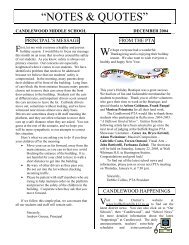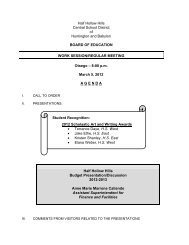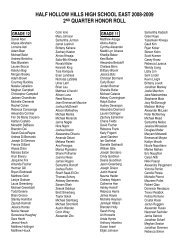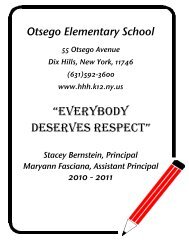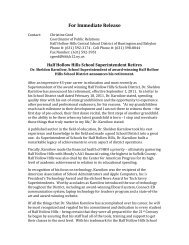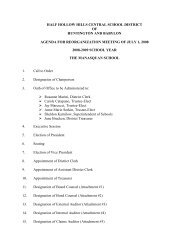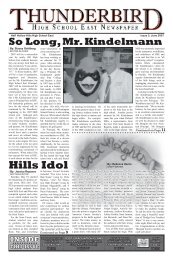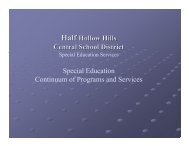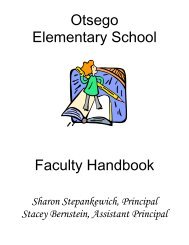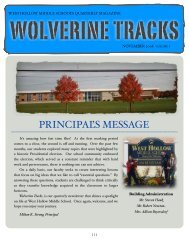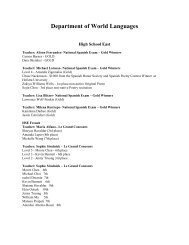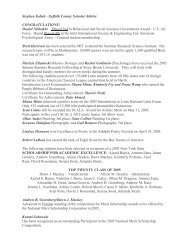STUDENT HANDBOOK - Half Hollow Hills
STUDENT HANDBOOK - Half Hollow Hills
STUDENT HANDBOOK - Half Hollow Hills
You also want an ePaper? Increase the reach of your titles
YUMPU automatically turns print PDFs into web optimized ePapers that Google loves.
DISCIPLINE POLICY STATEMENT<br />
The Board of Education of the <strong>Half</strong> <strong>Hollow</strong> <strong>Hills</strong> Central School District of Huntington and Babylon is<br />
based on a belief in democracy and the democratic process. We believe that a sound education includes<br />
instruction on how to live in a democracy on a practical level, not just in theory but through curriculum<br />
instruction in social studies and civics. To appreciate the fundamental fact that the rights of the individual<br />
can only be preserved by the protection of the rights of others, students must live in a school environment<br />
where these rights and responsibilities are actively demonstrated on a daily basis.<br />
We further believe that in addition to teaching and modeling democratic principles in the schools, we<br />
have an additional responsibility to provide an educational climate that promotes the optimum learning<br />
experience for each student. For the pursuit of excellence to take place in the school community, a code of<br />
discipline is essential. In this sense, discipline is not a negative concept but is a body of rights and<br />
responsibilities that creates a healthy learning environment where students are physically and emotionally<br />
safe and, therefore, able to develop intellectually, creatively, and socially. Students and parents can be<br />
assured that the establishment of a district-wide code of discipline supports their own aspirations for<br />
excellence education - the goal to which <strong>Half</strong> <strong>Hollow</strong> <strong>Hills</strong> Central School District has historically been<br />
dedicated.<br />
Finally, the Board is committed to the adoption of sound principles of child rearing. Longitudinal<br />
educational research indicates that children require both responsibilities and limits to develop positive<br />
self-regard. The absence of discipline (limits) or, on the other hand, discipline that is overly-harsh tends to<br />
develop personalities that are, respectively, overly-aggressive and overly-passive. Both of these<br />
personality structures get negative responses from the school community and from society at large. Since<br />
positive self-regard depends largely on the attitudes that significant adults display toward appropriate<br />
behavior, students then learn self-respect as they get adult approval for their behavior.<br />
The discipline code has been developed to incorporate the policies stated above. When we overview the<br />
educational program and our discipline code, we feel confident that we are providing our students with<br />
the necessary tools to become good citizens who will make positive contributions to their families, their<br />
community, and their country.<br />
OVERVIEW<br />
Good school discipline provides consistency and direction. Students and parents know what specific steps<br />
will be taken when a rule is broken and also know the proper steps to take if they are dissatisfied.<br />
Discipline is most effective when it deals directly with the problem at the time and place it occurs and in a<br />
way that is viewed as fair and impartial by the student. Therefore, before seeking outside assistance,<br />
teachers will first use all their resources to create a change of behavior in the classroom. When the teacher<br />
has made every reasonable effort to bring about positive behavioral change and has been unsuccessful, the<br />
student will be referred to the administration who will determine what further action will be most<br />
appropriate to effect positive change for the student and for the building.<br />
The rules and standards of appropriate behavior apply to conduct on school premises, on school buses,<br />
and at school functions of any kind. The expectation is that students will be able to discriminate between<br />
appropriate and inappropriate behavior in accordance with their age level and intellectual ability. It is<br />
also expected that students will report, to the appropriate school authority, any situation that is considered<br />
dangerous or inappropriate.<br />
Students live and function, as do adults, in the community. As citizens, students are also subject to its<br />
national, state and local laws and school rules governing various aspects of conduct. Not all laws or rules<br />
are easy to follow nor need one necessarily agree with each and every law or rule. If a law or rule seems<br />
unjust or inappropriate, citizens have a right to petition our government to change that law or rule.<br />
Likewise, parents and students have the right to question the fairness and justness of certain school rules.<br />
However, in the meantime, the law or rule must be followed to have an orderly and manageable<br />
framework within which to operate.<br />
17



